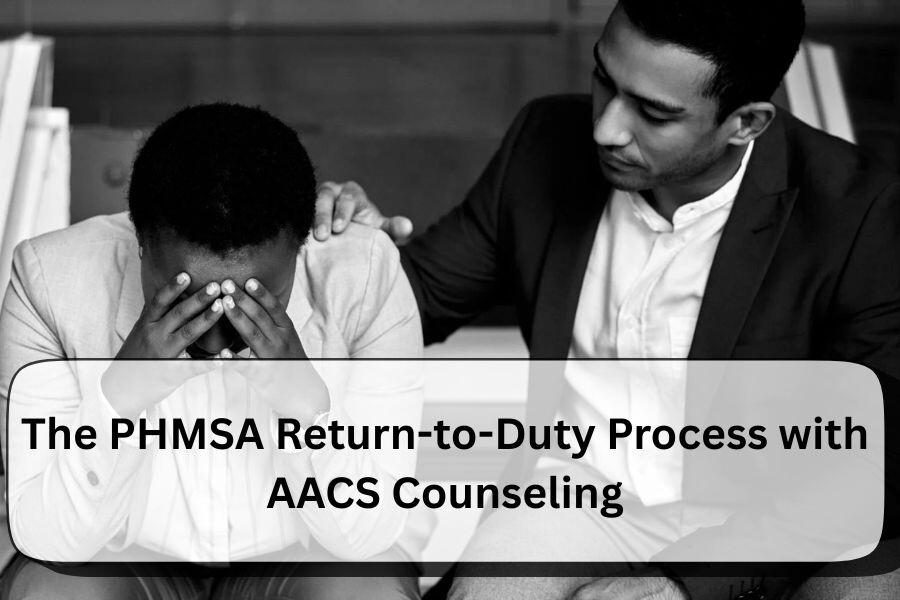If you are a CDL driver or DOT-regulated employee who has failed or refused a DOT drug or alcohol test, one of the first questions you will ask is:
How long does the DOT SAP Program take?
This is one of the most common and most urgent questions in the transportation industry. When your livelihood depends on returning to safety-sensitive work, every day matters. The DOT SAP Program is a federally required process, but the timeline depends heavily on when you begin, how efficiently your case is managed, and the provider you choose.
At AACS Counseling, we specialize in helping drivers complete the DOT SAP Program as fast and affordably as possible. We are known as one of the fastest and most cost-effective providers of the DOT SAP Program nationwide, offering 100% virtual SAP evaluations, rapid scheduling, and clear, step-by-step guidance.
In this article, we will break down:
- The full DOT SAP Program timeline
- What affects how long it takes
- The fastest possible return-to-duty timeframe
- Common delays drivers face
- How AACS Counseling helps speed up the process
What Is the DOT SAP Program?
The DOT SAP Program is required under U.S. Department of Transportation regulations (49 CFR Part 40) for any safety-sensitive employee who violates DOT drug and alcohol testing rules.
This includes:
- Failed DOT drug test
- Failed DOT alcohol test
- Refusal to test
- Adulterated or substituted sample
The SAP Program is the only federally recognized pathway back to safety-sensitive work.
A Substance Abuse Professional (SAP) is responsible for evaluating the employee, recommending education or treatment, and determining when the employee can return to duty.
The Big Question: How Long Does the DOT SAP Program Take?
The DOT SAP Program can take anywhere from:
- A few days (fast-track cases)
to - Several months (complex treatment cases)
Most drivers complete the process in:
2 to 8 weeks, depending on compliance requirements.
The timeline depends on:
- How quickly can you schedule your SAP evaluation
- Whether education or treatment is required
- Provider responsiveness
- Your ability to complete recommendations
- Testing availability
At AACS Counseling, we focus on minimizing unnecessary delays and helping drivers return to work as quickly as permitted by DOT regulations.
DOT SAP Program Timeline: Step-by-Step Breakdown
Let’s walk through each phase and the typical timeline.
Step 1: Scheduling the Initial SAP Evaluation
Timeframe: 1–2 days
The first step is completing your initial SAP evaluation.
Many drivers delay this step due to confusion or cost, but the truth is:
Your timeline does not start until you meet with a SAP.
At AACS Counseling, we offer:
- Same-day or next-day appointments
- 100% virtual evaluations
- Affordable pricing and financing options
Fast scheduling is one of the biggest reasons we are considered one of the fastest DOT SAP providers nationwide.
Step 2: Initial DOT SAP Evaluation Appointment
Timeframe: 1 day
The evaluation itself typically takes:
- 30–60 minutes
During this appointment, the SAP will:
- Review your DOT violation
- Assess substance use history
- Determine clinical risk
- Recommend education or treatment
- Create your compliance plan
This evaluation is required before you can move forward.
Step 3: Completing SAP Education or Treatment Recommendation
Timeframe: 2 – 4 Days or 1–12 weeks
This phase determines most of the overall timeline.
The SAP may recommend:
Education Only (Fastest Option)
- Typically 8–20 hours
- Can often be completed in A few days
Outpatient Treatment (Moderate Timeline)
- Weekly counseling or structured program
- Usually 1–8 weeks
Intensive Outpatient or Higher Care (Longer Timeline)
- Required for higher-risk cases
- May take 8–12+ weeks
The SAP—not the employer—determines the required level.
AACS Counseling helps clients quickly enroll in approved services, reducing wasted time.
Step 4: Follow-Up SAP Evaluation
Timeframe: 1 days after completion
Once you complete the required education or treatment, you must return to the SAP for a follow-up evaluation.
This appointment confirms:
- Compliance completion
- Readiness for return-to-duty testing
- Follow-up testing plan requirements
At AACS Counseling, follow-up evaluations are scheduled quickly, often within days.
Step 5: Return-to-Duty Drug Test
Timeframe: 1-2 days
After SAP approval, you must take a Return-to-Duty (RTD) test.
Important details:
- Must be directly observed
- Must be negative
- Must be arranged through the employer/consortium
Testing availability depends on location and employer coordination, but AACS Counseling helps ensure documentation is processed rapidly.
Step 6: Follow-Up Testing Plan (After Return to Work)
Timeframe: 12–60 months
Once you return to duty, the SAP establishes a follow-up testing plan:
- Minimum of 6 unannounced tests
- Up to 5 years of monitoring
This does not delay your return to work, but it is mandatory compliance afterward.
Fastest Possible DOT SAP Program Timeline
So, what is the fastest you can realistically complete the DOT SAP Program?
Fast-Track Timeline (Education Only Case)
- Initial SAP evaluation: 1–2 days
- Education requirement: 2-4 days or 1–2 weeks
- Follow-up evaluation: 1–2 days
- RTD test scheduling: 1 day
Total: 2–3 weeks
This is possible when:
- No high-risk substance history is present
- Education is the only recommendation
- The client acts immediately
- Provider is efficient
AACS Counseling specializes in helping drivers complete the process in the shortest allowable timeframe.
Average DOT SAP Program Timeline
Most clients fall into this range:
- Evaluation + treatment: 2-4 Days or 1–6 weeks
- Follow-up + RTD test: 1-2 Days
Total: 1– 6 weeks
This is the most common timeline nationwide.
Longest DOT SAP Program Timeline (High-Need Cases)
Some cases take longer due to:
- Intensive outpatient treatment requirements
- Delayed attendance
- Missed sessions
- Multiple violations
- Employer delays in RTD testing
These cases may take:
1– 3 months
AACS Counseling helps reduce unnecessary delays even in complex cases through structured case management.
What Causes Delays in the DOT SAP Program?
The DOT SAP Program is straightforward, but drivers often lose weeks or months due to preventable issues.
Common Delays Include:
- Waiting too long to schedule an evaluation
- Choosing slow or unresponsive SAP providers
- Not completing education/treatment promptly
- Misunderstanding requirements
- Employer delays with testing
- Lack of documentation coordination
AACS Counseling eliminates these delays with rapid scheduling and step-by-step support.
Why AACS Counseling Is the Fastest and Cheapest DOT SAP Program Nationwide
Drivers choose AACS Counseling because we combine speed, affordability, and compliance.
Our Advantages Include:
- Same-day virtual SAP evaluations
- Nationwide service in all 50 states
- Clear DOT-compliant documentation
- Fast follow-up scheduling
- Affordable pricing
- In-house financing available
- Support through the entire return-to-duty process
We understand that time off work is expensive. Our goal is to get you back to work as quickly as possible.
100% Virtual DOT SAP Program Services
AACS Counseling offers fully virtual services, including:
- Initial SAP evaluation
- Follow-up SAP evaluation
- Case management support
- Documentation processing
Benefits:
- No travel required
- Faster appointment access
- Convenient scheduling
- Confidential HIPAA-compliant sessions
Virtual SAP services are ideal for drivers nationwide.
DOT SAP Program Cost and Financing Options
Many drivers ask:
How much does the DOT SAP Program cost?
Costs vary based on education or treatment requirements, but AACS Counseling is known as one of the most affordable nationwide providers.
We offer:
- Transparent pricing
- No hidden fees
- In-house financing options
This allows drivers to begin immediately rather than delay due to financial stress.
Frequently Asked Questions: DOT SAP Program Timeline
Can I complete the DOT SAP Program in one week?
Yes, where education is minimal, and testing is immediate. 2- 4 Days
Only in rare cases, treatment may be recommended. Most cases take 2–8 weeks.
Does the DOT SAP Program expire?
No, but follow-up testing plans remain active for years.
Can I choose my SAP provider?
Yes. You may choose a qualified SAP.
Does my employer control the timeline?
Employers coordinate RTD testing, but SAP steps are clinical and independent.
What if I fail the Return-to-Duty test?
You must restart the SAP process, which adds significant time.
The Bottom Line: How Long Does the DOT SAP Program Take?
The DOT SAP Program timeline depends on clinical requirements, but most drivers complete it in:
2–4 Days
Fast-track cases may take:
2–3 weeks
Complex treatment cases may take:
3–6 months
The fastest way to return to duty is to choose an experienced provider who schedules quickly, communicates clearly, and guides you through compliance without delay.
Start the DOT SAP Program Today with AACS Counseling
If you need the fastest and cheapest DOT SAP Program nationwide, AACS Counseling is here to help.
We provide:
- Fast virtual SAP evaluations
- Affordable nationwide services
- Clear step-by-step compliance guidance
- In-house financing options
- Rapid return-to-duty support
Call today: 800-683-7745
Email: info@aacscounseling.com
Don’t wait. The sooner you start, the sooner you can return to work.




















